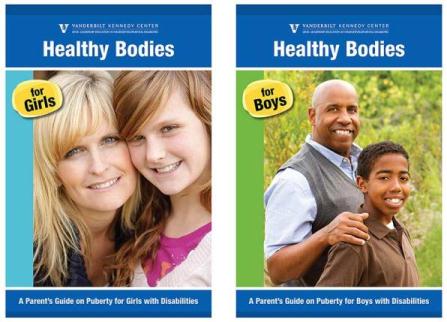'Healthy Bodies' Toolkit Addresses Puberty in Adolescents with Developmental Disabilities
July 23, 2013

|
When you ask parents of adolescents and teens with intellectual and developmental disabilities about the challenges their families are currently facing, more often than not issues related to puberty will make it to the top of the list. While young people with disabilities will go through many of the same physical and emotional changes that typically developing young people will go through, unique challenges may make this a somewhat stressful time for families.
A new toolkit Healthy Bodies: A Parent's Guide on Puberty for Adolescents with Disabilities addresses the needs of these families and is a response to the limited number of practical resources about puberty and disabilities. The toolkit was developed by Vanderbilt University Assistant Professor of Pediatrics Cassandra Newsom, Psy.D., and trainees in the Vanderbilt Leadership Education in Neurodevelopmental and Related Disabilities (LEND) Training Program. It has been produced and is being disseminated by the Vanderbilt Kennedy Center for Excellence in Developmental Disabilities.
The toolkit is written for a broad range of disabilities and provides a wide variety of visual supports and social stories that are especially useful for youth with autism or youth who are nonverbal. So that visuals and information fit gender, both male and female toolkits have been produced. The toolkit deals simply and directly with practical matters of puberty. Examples of topics and supports include hygiene, menstruation, nocturnal emissions, and appropriate behavior in public vs. private settings.
"Puberty and sexuality are difficult topics," said Newsom. "There are cultural and societal taboos at play, and many parents just do not want to think about their kids as sexual beings. It also is not uncommon for parents to be under the impression that if a child is delayed developmentally, he or she will be delayed in puberty and in the development of their sexuality. This is not necessarily the case. In fact, some people with disabilities will enter puberty early. So, we wanted to develop this toolkit for parents to clear up some of these taboos and misperceptions. We also wanted to be sure that parents understand that just because their kids might not be talking about dating or sex, it does not mean that their bodies are not changing, that their hormones are not running rampant, that they don't need to be introduced to these topics."
In fact, it is suggested that parents start talking with their kids about the changes they can expect before they enter puberty. And as with teaching any new skill, many young people with autism and/or intellectual disabilities will benefit most from simple, clear, and concrete information with opportunities for repetition, practice, and application. Empowering adolescents with a greater understanding of their own bodies can reduce anxieties and increase personal comfort and independence.
In addition, there are issues of personal safety. We know that people with disabilities are at a higher risk for being taken advantage of, for abuse, or for behaving in ways that may be considered socially inappropriate and getting in trouble for it. By opening a dialogue and teaching about appropriate and inappropriate behaviors, youth will be better equipped to handle uncomfortable or perilous situations. In fact, the American Academy of Pediatrics has stated that the likelihood of abuse is reduced or eliminated when sexual questions and behaviors are freely discussed within a family.
Healthy Bodies: A Parent's Guide on Puberty for Adolescents With Disabilities may be downloaded free of charge at: kc.vanderbilt.edu/healthybodies.







